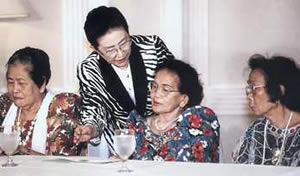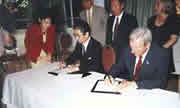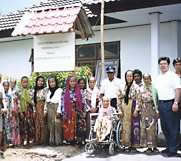|
In the Philippines, applications are submitted under the assistance of LILA-PILIPINA, a prominent women’s group, and the Asian Center for Women’s Human Rights (ASCENT), which promotes the human rights of women. The applications are examined by a task force of the Philippine Government called Task Force on Filipino Comfort Women (TFFCW) (composed of officials in departments and agencies of the Philippine Government). Those who have been recognized as former comfort women are provided with “atonement money” by the Asian Women’s Fund. The AWF also implements, for their benefit, medical and welfare support projects through the Philippine Government’s Department of Social Welfare and Development. Applications are being received steadily and verification procedures are continuing. At the present time, almost 160 applications are in the process of being examined, and we expect that more applications will be made before the deadline, August 2001, a date less than a year away. Government’s Department of Social Welfare and Development. Applications are being received steadily and verification procedures are continuing. At the present time, almost 160 applications are in the process of being examined, and we expect that more applications will be made before the deadline, August 2001, a date less than a year away.
In the Republic of Korea, the AWF has not been able to obtain the understanding of the media or activists’ groups that are promoting a campaign with former comfort women. The AWF was criticized after projects were implemented for seven people who applied in January 1997, and as a result the projects were temporarily suspended. Projects began again in January 1998, after notices were placed in four of the country’s newspapers. Later, the Korean Government began providing public assistance payments, after which the AWF requested, in a letter signed by its former President, Bunbei Hara, that it be recognized that potential recipients could receive both the AWF’s “atonement money” and the Korean Government’s public assistance payments because the two were different in nature. Negotiations and various developments then transpired, leading to the present suspension of projects in the Republic of Korea, out of respect for the Government’s position and public opinion there. The AWF hopes to continue efforts aimed at obtaining understanding for its projects.
In Taiwan, too, the AWF has not been able to obtain the understanding of the authorities or prominent women’s groups. Against this backdrop, the AWF is cooperating with a lawyer, Mr. Lai Hao Min, who has stated that the feelings of the former comfort women should be respected. The AWF has designated his Wanguo Law Office as the place where applications for support can be sent. In May 1997, the AWF placed notices in three Taiwanese newspapers. Once a year since then, it has placed the same notices in newspapers in Taiwan, so that as many victims as possible can learn about the AWF’s projects, and so that other people, too, will correctly understand the nature and purpose of the projects.
Former comfort women who have accepted support under the AWF’s projects of atonement have expressed to us some of their profound emotions.
One Korean victim decided to accept benefits from the AWF, but indicated at first that she was unwilling to meet a Fund representative. However, she later agreed to a meeting. Upon hearing the representative read aloud to her the letter from the Prime Minister, she burst into tears, hugged the AWF’s representative, and began to speak through her tears about her experiences as a comfort woman and the suffering she had endured after returning to her own country. From this, we believe that she has completely accepted the sincere expressions of apology and remorse of the Government and people of Japan.

With regard to the Netherlands, on 15 July 1998, a Memorandum of Understanding was signed between the AWF and the Project Implementation Committee in the Netherlands. Medical and welfare support projects have been
implemented under the MOU, on a scale of 255 million yen. Seventy-seven victims have accepted support, and the project is now close to completion.
In his letter to the Prime Minister of the Netherlands, Japan’s Prime Minister expressed his Government’s most sincere apologies and remorse to all former comfort women. The letter was later given to each victim recipient. Some victims sent the Project Implementation Committee their expressions of gratitude and personal messages, and here I would like to quote from one of those letters: “I thank you for all you have done and are committed to doing for me. I thank you not only for this monetary compensation, but also for having recognized the misery I experienced as a girl of 15. You have softened the pain of a wound that is still open, a wound I have endured through life.”
 The Indonesian Government indicated that it would not identify any former comfort women, and stated to the Government of Japan that it would like to receive support not in the form of assistance for individual former comfort women, but in the form of social welfare services for elderly people. After this The Indonesian Government indicated that it would not identify any former comfort women, and stated to the Government of Japan that it would like to receive support not in the form of assistance for individual former comfort women, but in the form of social welfare services for elderly people. After this
request was relayed from the Japanese Government to the Asian Women’s Fund, on 25 March 1997, the AWF concluded a Memorandum of Understanding with the Department of Social Affairs of the Government of Indonesia. Under the terms of the MOU, financial support for elderly people, amounting to a total of 380 million yen, is to be provided over 10 years. During the first two years of the project, 11 facilities for the elderly were completed, and 124 people are now accommodated there.
|

